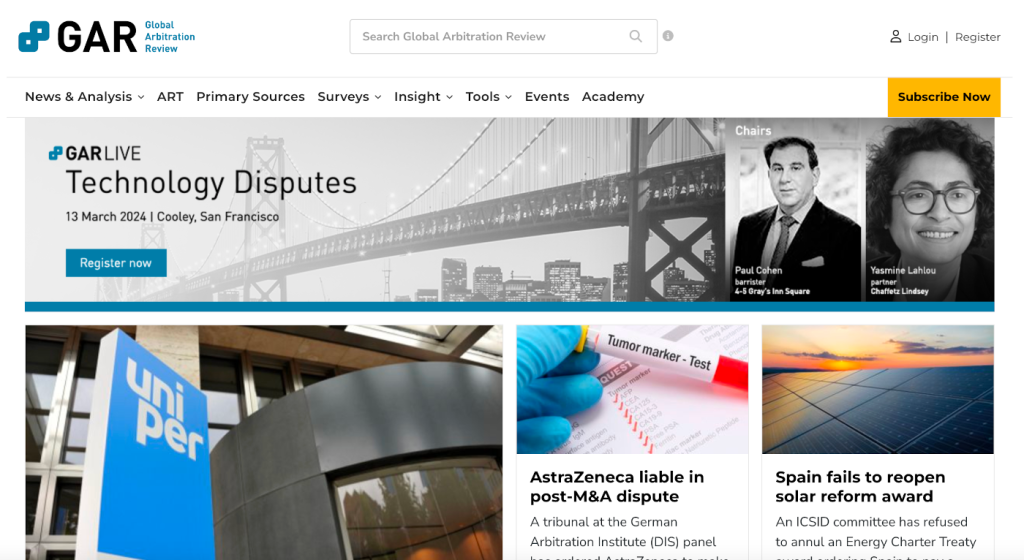Last academic year, LLM student Ashley Gate (and member of the Lawbore Journalist Team for 2022-23) interviewed City LLB alumni Tom Jones. Tom is Deputy Editor of Global Arbitration Review, the world’s leading international arbitration journal and we were delighted when he agreed to be interviewed as it gave us the chance to highlight one of the many ways of using your law outside of the solicitor/barrister route. But a communication mishap meant it never saw the light of day! So, even though Ashley has now graduated, here is the interview. And it’s a fascinating one. The delayed publishing date only stands out when you get to the questions about news stories in 2022 and 2023… Enjoy!

Q: Moving from Law to journalism/publishing is not a pathway we see too often, what started you off down this road Tom?
In all honesty, (and I think this will be a position many graduates will sympathise with), I was struggling to make any headway with training contracts. I began looking for alternative job options that would still allow me to develop legal knowledge, and I just so happened to find an opening at Global Arbitration Review on a job website.
Q: Whilst at City your extra-curricular interests were quite diverse; helping start-ups deal with their intellectual property issues and carrying out immigration research for a professor. What was it about IP that really grabbed your attention?
While patents and trademarks are undoubtedly interesting areas of law, it was copyright that really drew me in. The ethical question of how to structure a legal framework in a way that protects the work of the creative, while ensuring that future creativity can be built on their labour, is something that still fascinates me to this day.
Q: You went on to write your dissertation on the validity of a parody defence to a copyright claim in UK IP Law, what were your most interesting findings, were there any cases you specifically focused on?
It is (depressingly) now almost ten years since I wrote my dissertation, but having given it a quick skim I think my most important finding was that parody (within limits of fair dealing and defined moral rights) is a win-win – as it advertises the original creation while creating space for parodies, which are vitally important both socially and artistically.
For those interested in the topic, the US Supreme Court’s decision in Campbell v Acuff-Rose Music is probably the place to start.
Q: Tell us about your work as a City Law Research Assistant under Dr Dan Wilsher*. What was involved and what did you have to produce? Did you face any challenges? Would you recommend the role to other students?
Dan needed assistance with his work on the detention of immigrants. Having not taking an Immigration Law module, it was definitely a challenge to get up to speed – but it proved a fascinating window both into a new area of law and the machinations of producing academic material.
Given that a large part of the work was pulling together Freedom of Information Requests for detention statistics from the UK government, it also served as very good preparation for my career as a journalist!
*Dan Wilsher left his academic position at City to concentrate on his role as an Immigration judge in the Immigration and Asylum Chamber of the First Tier Tribunal.
Q: You later worked as a Legal Officer for the Global Legal Action Network (GLAN) what made you shift from IP and immigration to human rights?
What skills did you gain during this period of employment? Were there different challenges in carrying out international human rights-based legal research?

The biggest lesson I learnt at GLAN was brilliant academic research must be combined with strategic planning and pure hard graft if you want to make an impact.
After I started working as a journalist full time (the GLAN role was only on a volunteer basis) I struggled to provide the support that brilliant team of academics needed, so I reluctantly left the role shortly afterwards.
Q: Back to the journalism, you began at the Global Arbitration Review in Assistant News Editor and Senior Writer roles. What skills from your law degree were helpful for this new field? Were any unhelpful?
Being able to process complex ideas and distil them into readable material is the key skill I have needed throughout my time at the Global Arbitration Review, and it is definitely something I learned during my Law degree.
Unhelpful lessons? I think the biggest challenge I had as a journalist was learning it is better to write simply. As lawyers I think we tend to write using rather grandiose verbiage (case in point) when it is often unnecessary.
Even in academic work or legal drafting, we could all benefit from using Orwell’s Six Rules for Writing.
Q: How did you get up to speed on arbitration? Did you study it at City?
I did! With the brilliant Grietje Baars – her International Arbitration module was the perfect introduction to this fascinating area of law.
Q: What was it like working as a writer for a newsroom? Did you get a lot of freedom in your writing, what was the process like for choosing what would be reported on?
Was it difficult to balance both roles? How did they differ?
As a writer, you search for news and then it is up to the editor what gets assigned. But once the story is yours, you have absolute freedom (and responsibility) to research and source the piece as you see fit.
As an editor, you need to assign stories not just on what you think is interesting, but ultimately what is of most interest to your readers.

Q: You are now a Deputy Editor at Global Arbitration Review (congratulations!) What does this entail and what is the biggest difference between this and the previous role? What is your favourite part of your new role?
Less writing and more editing, which does have the happy consequence of allowing me to analyse (and learn from) a greater number of stories in a day. I never take for granted a job that allows me to learn new things every day.
Q: What were the most popular stories in GAR from 2022 and are you already getting a feel for what your team will be writing about in 2023?

Undoubtedly the P&ID v Nigeria case. To the uninitiated, this remarkable case led to an award worth US$11 billion against Nigeria which has now been set aside by the English courts, following a finding that this ruling was procured through false evidence, corrupt payments and improper retention of leaked documents.
To the detractors of international arbitration, the case is an example of the most severe abuses of process than can occur in proceedings conducted outside the public gaze. To arbitration’s proponents, the case shows the system working well – with courts standing ready to intervene when needed.
Q: What are the biggest challenges in the legal publishing sector in 2023?
Continuing to provide an invaluable resource for a legal sector that is evolving and innovating at breakneck speed. Like most other industries, the legal publishing sector must also reckon with the impact of artificial intelligence.
Q: For those student reading who might be thinking writing and editorial work is for them, what advice can you offer in terms of breaking into the sector and work experience they should seek?
Writing is only learnt through practice. Join the student newspaper (I was City’s intrepid sports correspondent, writing incredibly biased articles about my own performances for the Men’s football team) and either keep a journal or start a blog. Write about anything and everything.

Be open to writing about different legal sectors. I am quite unusual in how long I have stayed writing about the same area – most of my friends and colleagues have ended up covering a wide variety in their careers.
So if you’re desperate to write about arbitration but a chance comes up to write about competition – take it. You’ll learn transferrable skills and be a more useful arbitration reporter anyway!
Q: Finally, I see you held one of the lead roles in the City Drama Society’s inaugural production of A Midsummer Night’s Dream. What was the role? Did you enjoy the experience? As a fellow ‘theatre kid’ would you say that your experience in theatre was beneficial to your work in the legal world?
I probably enjoyed it a lot more than the audience did. My brother (a professional actor who trained at LAMDA) said that I was “loud”. As positive a review as I could have hoped for.
I genuinely believe that theatre teaches you endless skills you can use in your professional life – how to portray confidence, manage nerves and build empathy and social skills.

Two of my (more talented) friends in that cast had careers as actors – so you never know!
Thanks to Ashley for penning the original questions for Tom. Ashley graduated from City in 2023, completing her LLM in International Human Rights Law. Ashley has a passion for politics, history and gardening and was a member of the Lawbore Journalist Team for 2022-23.

